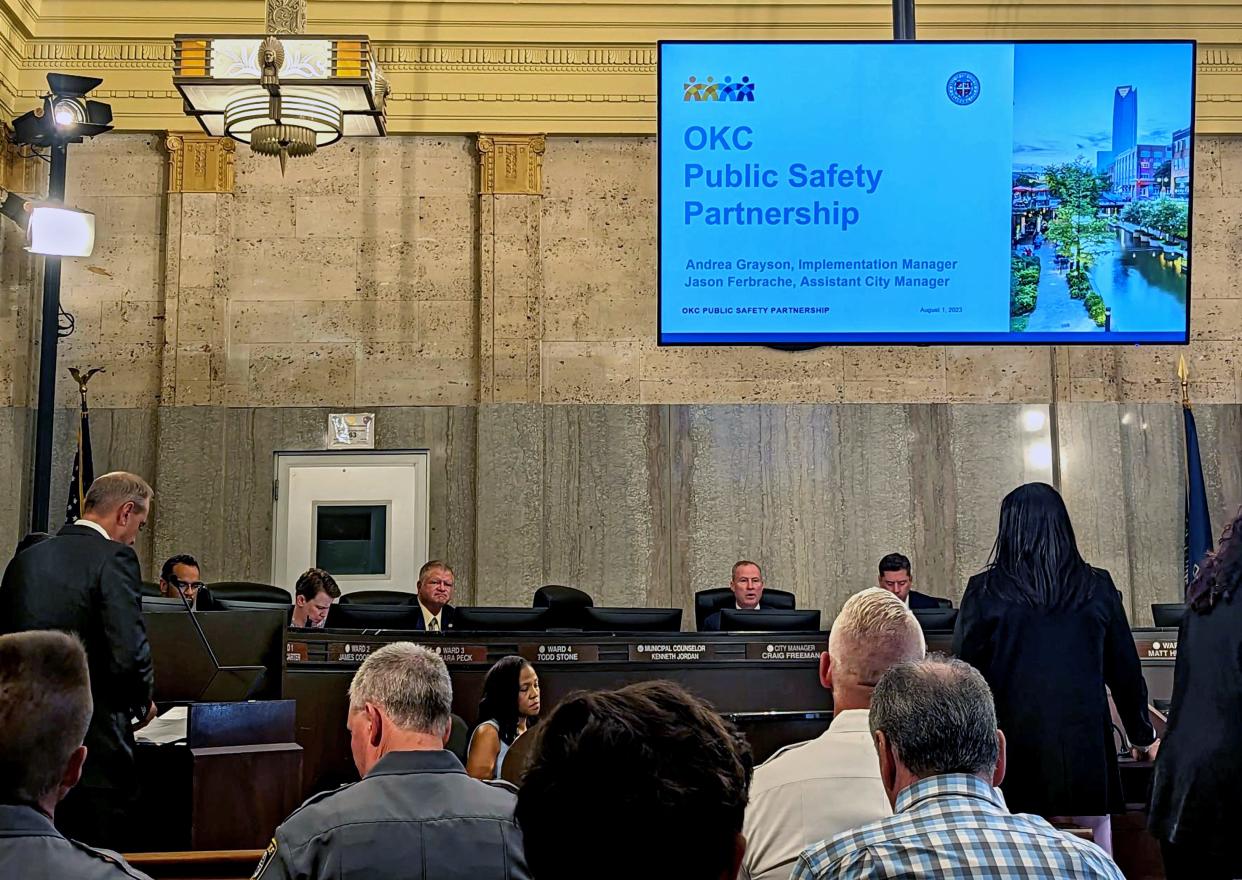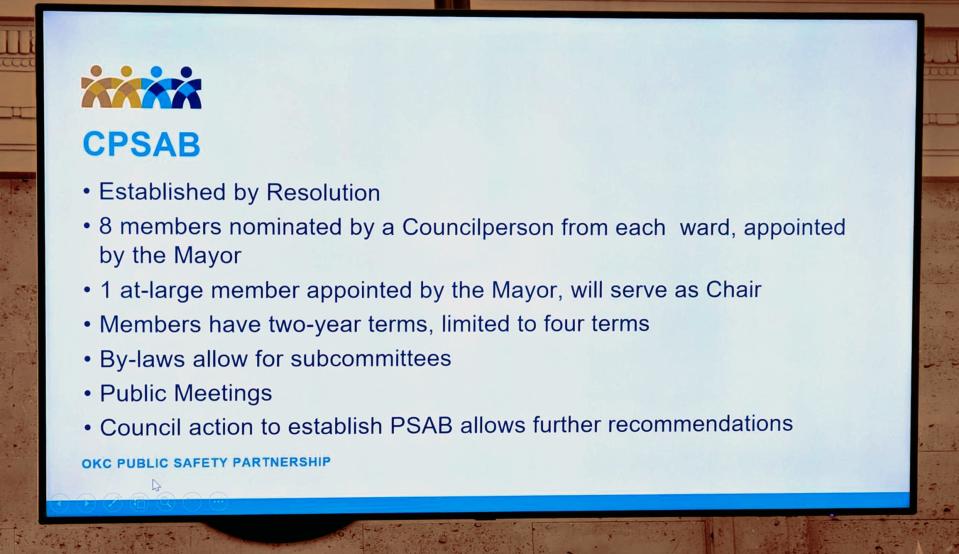Now that OKC has replaced its police oversight board, what's changing? What we know

- Oops!Something went wrong.Please try again later.
Oklahoma City management has announced a little-known police oversight board has officially been dissolved in the wake of a tense Oklahoma City Council meeting this month.
Before the death of George Floyd in 2020 and ensuing protests for police transparency, many residents of Oklahoma City ― including members of the city council ― didn't know the board existed.
As scrutiny toward police rose, so did scrutiny of the board.
“It was a board that was largely, essentially, appointed by the police department," said Oklahoma City Mayor David Holt. "And that’s not to say the appointments of it had any poor intentions, but that doesn’t on paper look like an independent accountability.”
Oklahoma City council voted last week to create a new version of the Citizens Advisory Board and change the name to the "Community Public Safety Advisory Board."
The vote passed 6-2 to replace the board and start anew, but many questions remain. Here's what we know:
Related: After heated discussion, OKC Council votes to replace police oversight board
What did the Oklahoma City Police Department Citizens Advisory Board do?
Begun in 2005, the Oklahoma City Police Department Citizens Advisory Board was meant to “maintain a partnership with the community in an effort to reduce crime and to enhance the quality of life,” according to 2017 bylaws.
The board’s role was to review investigations of complaints by citizens against police, including allegations of excessive force and other misconduct, and then give suggestions and recommendations to the police chief.
In theory, the board was meant to build trust between the Oklahoma City community and police. But in practice, the board couldn't run its own investigations or discipline officers. Members only reviewed internal investigations that had been completed by police, and by the time the board would examine a case, the officers involved would have already been disciplined.
Related: Oklahoma City Police's Citizens Advisory Board treads line between accountability, secrecy
What problems did critics have with OKC's Citizens Advisory Board?
Critics argued that, although the former oversight board opened dialogue between the community and police, it lacked transparency with its membership process and was ineffective in providing accountability for complaints.
Ward 6 Councilwoman JoBeth Hamon believes the previous board had “very little recourse legally and systematically” to do anything further with cases brought before them after police had already closed their investigations.
“With the way the legal structure of it was set up, there isn’t a lot of policy to say, ‘Yes, that was an excessive use of force,’” Hamon told The Oklahoman. “The board couldn’t take any action that goes beyond what disciplinary procedures the department already has in place.”
Andrea Grayson is the implementation manager for the upcoming OKC Public Safety Partnership, the new title for a collective of task forces working with various city agencies on police reform proposals. She said she discovered a lack of resources was also a major issue for the previous board as she consulted its members.
They did have technical support and research support from the police department, Grayson said, but the group “didn’t have the resources” to publicly report police activities through a coordination plan or an education program.
Why completely change the board? Is there a lapse in coverage?
Holt said many agreed that “a new mechanism” was needed to improve accountability. A proposal for a new oversight board was included in the 39 police reform recommendations provided by the 21CP consulting firm to the city's Law Enforcement Task Force and Community Policing Working Group.
Members of the prior board had left their roles in May as the Citizens Advisory Board began dissolving to prepare for last week's vote to start the new iteration.
“We’ve all resigned,” longtime board member Don Graham said Wednesday. “That board does not exist anymore, as of (last) Tuesday.”
So while new board members are selected in the coming weeks, there will be no active citizen-led board serving as an accountability check on police complaints until later this fall.
Until the board stands up, police complaints can still be submitted, Hamon said, but the new board will likely have to deal with a steep backlog once all of its roles are filled.
How will the new Community Public Safety Advisory Board differ from the old board?

The main change, Grayson said, is to have a more "democratic process" by making adjustments to member roles.
The new advisory board is expected to conduct monthly open meetings. It will consist of eight members nominated by the councilmember from each ward, all approved by the mayor, and one at-large member also would be appointed by the mayor and would chair the group.
Unlike the previous board, members of the new public safety advisory board members have term limits ― up to four two-year terms ― while the previous advisory board allowed members in good standing to serve indefinitely. At the time the previous board was dissolved, multiple members had served on it since its inception nearly two decades ago.
In recommendations to rename and reconfigure the board, Grayson said she reached out to numerous city agencies, organizations, and multiple municipalities and consulting groups throughout the country to reflect best practices with the new public safety approach.
“We did do quite a bit of research, but we wanted our big thing to be using the word 'community' as opposed to 'citizen,'” Grayson said. “It was that this advisory board was for everyone. We didn't want to seem exclusive. We wanted to be inclusive, and so in using that word 'community,' I think we're really communicating that shift.”
Related: Police reform progress complicated by crime, public safety concerns
What about the new iteration were city councilmembers dissatisfied with?
Hamon voiced misgivings about the proposed language regarding some of what the new board’s oversight could encompass. She said broadening the title of the board, from "police department" oversight to "public safety," might cause confusion for some residents who interpret the concept of public safety as including stable housing and mental health treatment, rather than only reviewing misconduct.
Hamon added that cases of police misconduct deserved a higher level of scrutiny because, unlike situations involving the fire department or other agencies, there is a greater degree of risk when police interact with members of the public due to the power officers carry.
“I think that just the language and possible vision of this board is really straying away from what the original recommendations we received from 21CP are,” Hamon said. “Police hold a different level of power over people and over our residents that requires a different level of scrutiny, and it really in my mind needs to be a singular task of a standalone board.”
Ward 7 Councilwoman Nikki Nice also questioned how the board could properly represent transparency if the mayor could appoint his own chair for the board, rather than the city council as a group selecting the board's leader.
To help residents understand its purpose, Hamon requested to rename the board the Community Review and Accountability Board ― an attempt that failed. Nice then formally requested the vote be delayed to a future council meeting so the conversation could continue, which also failed.
“We could have all at least talked through what the possibilities could have been and found out what other ways we could have compromised on how this could have better serviced constituents and our residents," Nice said. "That’s what we wanted to ensure ― that there was at least autonomy and transparency, but we’re already starting with this process with the lack of both.”
What does the mayor think of the board changes?
Holt defended his vote, saying that he was only one of several to vote in favor of the board, that he did not introduce the resolution and that the city government is “not mayoral-centric.” He argued that what the board is called is “the least important thing” about it compared to what its work could accomplish, but said that most of the council “was fine with” the new title.
“Its name is not something I feel passionately about one way or the other,” Holt told The Oklahoman. “It’s a name that I think accurately characterizes the situation at hand: It’s Public Safety, and then the other part of the name, ‘Advisory Board,’ already mirrors language we’re used to with MAPS 4 and other advisory boards we have, so it’s a kind of model that our residents are familiar with. So, I think, for me, the name was satisfactory, and I was not persuaded to go a different direction.”
More: Police reform panel makes oversight proposals
Who was on the previous police oversight board?
According to the city manager's office, eight people were serving on the former Oklahoma City Police Department Citizens Advisory Board at the time of its disbandment. They included:
Malaka Elyazgi, a member of the Oklahoma Commission on the Status of Women, “the voice of women to the (state) legislature” for three decades, according to the website. Elyazgi was the advisory board’s chairperson at the time of its disbandment, Graham told The Oklahoman.
Don Graham, who has worked for the Home Savings and Loan Association for 37 years. A lifetime resident of south Oklahoma City, he also was once a member of the Capitol Hill Main Street group, before it was rebranded as Calle Dos Cinco.
Mannix Barnes, a member of the original Citizens Advisory Board since it began. Barnes resigned in December 2022 as superintendent of the Western Heights school district amid mounting pressure after his tenure threw the schools into turmoil.
Robert Everman, who had also resigned due to "health issues" as president of the Western Heights school board in late 2022. Everman was a longtime close associate of Barnes, with whom he worked at several organizations and businesses.
Michael Brooks, a pastor in northeast Oklahoma City. He retired from Tinker Air Force Base before his time on the board.
Jacob Hill, a disability specialist who also served as a certified Council for Law Enforcement Education and Training, or CLEET, instructor. According to Graham, Hill stepped away from his past role as the advisory board’s chair due to illness but continued serving on the board into 2023.
Hooria Suhaib, a licensed professional counselor and mental health consultant. Suhaib was among the former board's newest members.
Maria Guzman, another behavioral therapist and school psychologist well-known in Oklahoma City's Latino community. She was also a newer member of the former oversight board.
The city's webpage for the board also listed Emergency Responders Assistance Program co-founder Doug White; OKC Hispanic Chamber ambassador Evelyn Cardona; and former OKC Black Chamber of Commerce board member Monica Finley as former board members. But staff at the city manager's office told The Oklahoman that these three no longer served on the board by the time it was dissolved.
Former bylaws stated a representative of police, selected by the department chief, also sat on the board as a non-voting member.
Will prior members rejoin? How would an interested person join?
When asked if he might be approached again to be a member of the new board, Graham said it was "a possibility," but expressed serious hesitation, noting that he thinks "it’s time to let new people in.”
Residents interested in serving on the new board should contact their ward's city councilperson, who will submit their recommendations for appointees by the end of August.
Depending on how long it takes for nominations to be vetted and approved, Hamon said it could be until late September or early October when the new board is finalized.
This article originally appeared on Oklahoman: What we know about OKC's revamped police oversight advisory board

